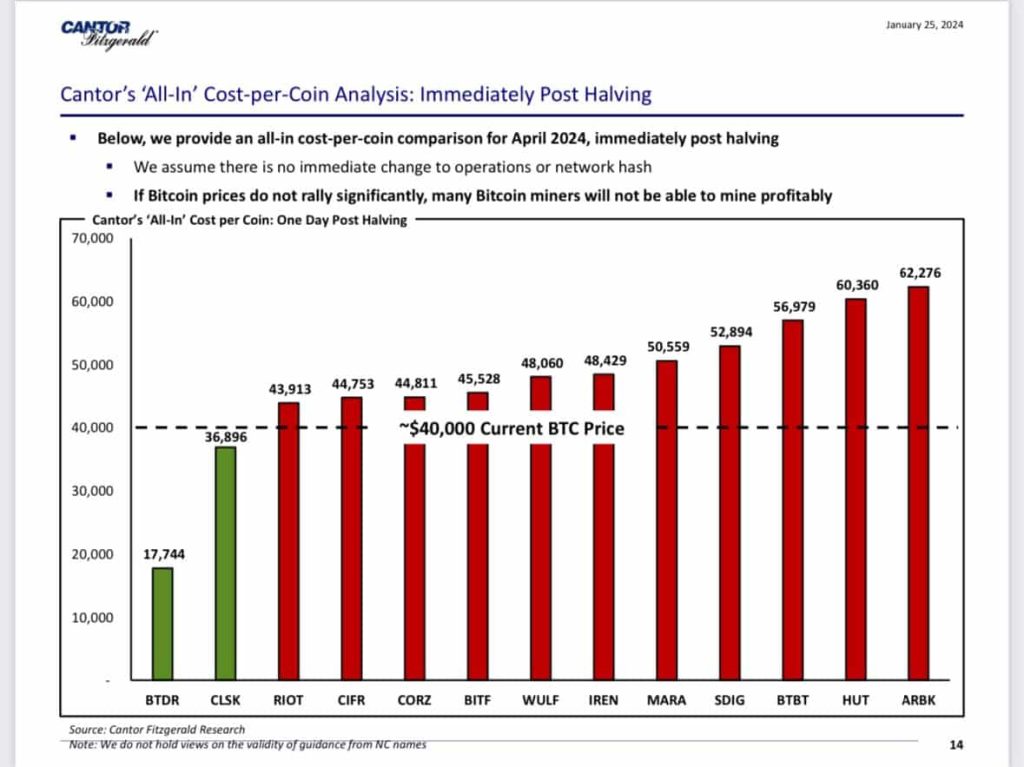- Recent analysis revealed that over 11 Bitcoin miners might face profitability challenges post-halving in April 2024
- Miners may resort to alternative financial strategies to hedge against Bitcoin’s price volatility
Cantor Fitzgerald, a financial services firm, is in the news today after its latest research report on Bitcoin. According to the same, there are significant challenges that haunt some of the largest publicly traded Bitcoin (BTC) mining companies after the upcoming halving event.
This event, scheduled for April 2024, is marked by a 50% reduction in block rewards for Bitcoin miners, a change that could dramatically affect their profitability.
Bitcoin mining unprofitable soon

Cantor’s recent report on Bitcoin mining – Image via Cantor Fitzgerald
The report highlighted concerns for eleven major Bitcoin miners – Argo Blockchain, Hut 8 Mining, Marathon Digital, Riot Platforms, Core Scientific, and many more. The critical issue for these companies is their “all in” cost-per-coin rate, which is currently higher than the prevailing Bitcoin price of around $40,000.
This disparity raises serious questions about their ability to remain profitable if Bitcoin’s price does not record a significant increase following the halving. If the price of Bitcoin does not undergo a sudden surge, companies might even face challenges to quench the basic costs of mining BTC.
Not all hope is lost
However, the scenario is not uniformly grim for all Bitcoin miners. The Cantor Fitzgerald report pointed out that certain miners like Singapore-based Bitdeer and U.S.-based CleanSpark can maintain profitability under the current conditions.
This assessment assumes a steady Bitcoin price of $40,000 and no significant changes in the hash rate. CleanSpark has estimated cost-per-coin rates of $36,896, which is comparatively lower than Bitcoin’s current price, suggesting a more favorable outcome for these firms post-halving.
This is evidence of the intrinsic connection between the revenues of Bitcoin miners and the volatile nature of Bitcoin prices. While the halving seems to be a positive event for Bitcoin’s value in the long term due to the reduced supply, it also brings to the forefront the operational challenges for miners, particularly those with higher costs.
These miners face the risk of their operations becoming unprofitable if Bitcoin’s price does not escalate enough to offset the reduced block rewards and cover operational expenses.
Unveiling the measures to fight these challenges
To counteract these risks, Bitcoin miners are adopting various strategies. Dan Rosen from Luxor, a Bitcoin mining firm, explained that miners often resort to derivatives like hash rate futures contracts and Bitcoin-related options. These financial instruments help to hedge against the price volatility of Bitcoin, providing a buffer against potential losses.
Market analysts and commentators are speculating about the potential impact of the halving on Bitcoin’s price, with many expecting a significant rise in the months following the event. However, the outcome remains uncertain, and the market’s response to the halving could have far-reaching implications for the profitability of Bitcoin mining operations.
This situation serves as a reminder of the inherent uncertainties and risks associated with the cryptocurrency market. Particularly for entities whose revenues are heavily dependent on the fluctuating value of digital assets like Bitcoin.

